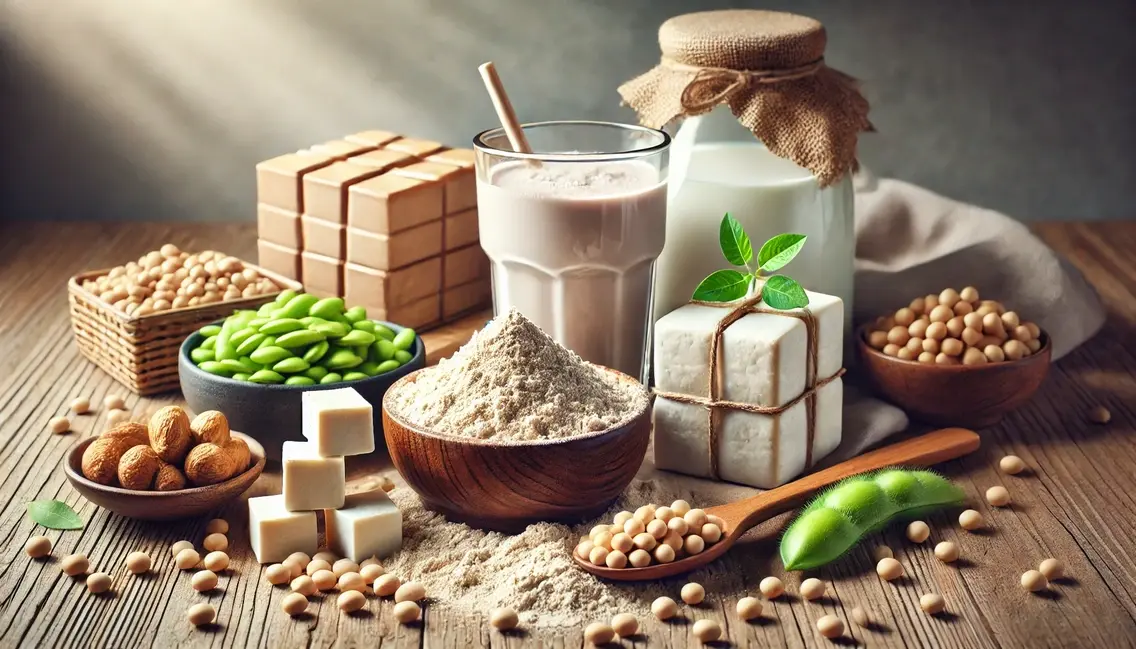The Surprising Secret of Soy: The Protein Powerhouse You Can’t Ignore
Imagine a protein source that's not only packed with essential amino acids but also unlocks a myriad of health benefits, including improved heart health and muscle recovery. Welcome to the world of soy protein, nature’s overlooked powerhouse derived from the humble soybean. Often overshadowed by its animal-based counterparts, soy protein boasts a nutritional profile that rivals even the most celebrated whey proteins—without the ethical complexities.
Yet, despite its stellar reputation in the scientific community, soy protein is frequently misunderstood. Some claim it disrupts hormones or induces digestive discomfort, casting doubt on its true value. So, why exactly do some bodybuilders steer clear of soy, and can it truly stifle your gains, or is this just another unfounded myth?
With research-backed insights and expert recommendations, this article will reveal the real benefits and misconceptions about soy protein. Whether you're a fitness enthusiast or simply someone seeking a healthier lifestyle, understanding soy could revolutionize your nutritional strategy. Let's dive into the essential facts and dismantle the myths—because the truth might just surprise you.
Health Benefits of Soy Protein
Soy protein, a key plant-based protein derived from soybeans, is renowned for its complete amino acid profile and adaptability in various diets. It serves as an excellent meat alternative, offering a range of health benefits, particularly for vegetarians and vegans in search of high-quality protein sources.
Key Health Benefits
- Complete Protein Source
Soy protein encompasses all the essential amino acids, qualifying it as a high-quality, complete protein. This feature is especially advantageous for vegetarians and vegans, as it supplies the necessary components for muscle growth and repair.
- Supports Heart Health
Consuming soy protein is linked to enhanced heart health. It has been shown to lower LDL cholesterol levels, reduce blood pressure, and support general cardiovascular wellness. The American Heart Association suggests a moderate consumption of around 25 grams per day to achieve these heart-related benefits.
- Potential Hormone Balance
While some concerns exist regarding phytoestrogens, research shows that soy protein doesn't adversely affect hormone levels. On the contrary, it may provide protective effects against hormone-related cancers, although further research is required to fully ascertain its impact.
- Aids in Weight Management
Aiding in weight management, soy protein is low in saturated fat and promotes a sense of fullness, which can help control overall calorie consumption. Its high protein content assists in retaining lean muscle mass during weight loss efforts.
Incorporating Soy Protein for Optimal Health
Adding soy protein to your diet can be a nutritious choice, bringing a host of health benefits that contribute to general well-being. For those looking to enhance their protein intake conveniently, Boost your protein intake with Yupik Organic Soy Protein Powder – 90% protein content per serving, perfect for smoothies and baking! provides a practical and delicious option, enriching your daily nutrition routine.
Dietary Sources of Soy Protein
Soy protein, derived from soybeans, is a high-quality, plant-based protein renowned for its complete amino acid profile. This makes it a preferred choice for vegetarians and vegans alike. While it's associated with numerous health benefits, such as supporting heart health, it's crucial to consume it mindfully, particularly if you have any health concerns. Let's examine some of the key natural sources of soy protein.
Natural Sources of Soy Protein
- Soybeans
Soybeans are the cornerstone source of soy protein. A cup of cooked soybeans delivers around 36 grams of protein, complete with all essential amino acids, thereby ranking as one of the most comprehensive plant-based protein sources.
- Tofu
Tofu is created from coagulated soy milk and offers a rich protein content alongside incredible versatility in cooking. It is a staple protein choice in vegetarian and vegan diets due to its adaptability and the variety of health benefits it provides.
- Tempeh
Tempeh is a fermented soy product known for its firm texture and robust flavor. It typically offers more protein than tofu and gains extra nutrients through the fermentation process, which aids digestive health.
- Soy Protein Isolate
This product involves processing soy to remove fats and carbohydrates, leading to a highly concentrated protein source, with approximately 90% protein by weight. It’s a typical ingredient in protein supplements and enhances various food products with added protein content.
Meeting Protein Needs
Although soy protein is abundantly available in certain foods, obtaining enough of this nutrient through diet alone can pose challenges. Factors such as dietary restrictions, limited cooking time, and food availability may hinder meeting daily protein requirements naturally. For those facing these challenges, protein supplements can offer an effective solution. For instance, integrating Yupik Organic Soy Protein Powder into your routine can be an efficient way to boost your protein intake. With a 90% protein content per serving, it's perfect for effortlessly enriching smoothies and baked recipes. As you aim to incorporate soy protein-rich foods into your diet, utilizing such supplements may provide the necessary support to achieve a well-rounded dietary regimen.
Daily Intake for Soy Protein
Soy protein is a high-quality, plant-based protein derived from soybeans. It contains all essential amino acids, making it a popular choice for vegetarians and vegans. Regular intake of soy protein can support heart health, muscle maintenance, and overall nutrition.
Recommended Daily Intake
The recommended daily intake of soy protein is an important component of overall protein consumption. Here are guidelines to help you determine how much soy protein you need:
- General guidelines for total protein intake: The average adult should consume 46 grams of protein per day for women and 56 grams per day for men, sourced from a variety of foods.
- The American Heart Association suggests that consuming approximately 25 grams of soy protein daily can help improve heart health.
Meeting Your Daily Soy Protein Needs
To achieve the recommended daily intake of soy protein, incorporate foods such as soy protein isolate, tempeh, tofu, and soy milk. Balancing soy proteins with other sources can ensure a diverse intake of essential nutrients, beneficial for both heart health and muscle maintenance. If you're looking for an efficient way to boost your intake, consider integrating Yupik Organic Soy Protein Powder, which offers 90% protein content per serving and is ideal for both smoothies and baking.
Maintaining the appropriate levels of soy protein daily is crucial. It ensures consistent nutritional benefits, reinforcing the importance of a balanced diet. Let’s explore the potential risks or symptoms associated with excessive or insufficient consumption, ensuring you maintain optimal health.
Deficiency of Soy Protein
Soy protein is a vital part of a vegetarian or vegan diet, offering all essential amino acids and serving as a complete protein source. However, being aware of the risks associated with a deficiency of soy protein is crucial for maintaining optimal health and well-being.
Deficiency Symptoms and Consequences
- Insufficient Amino Acid Intake
Soy protein provides all essential amino acids needed for critical functions such as muscle repair, immune system support, and enzyme production. When soy protein intake is inadequate, especially in vegetarian diets, it can lead to a shortfall in these amino acids, which may compromise muscle health and overall physiological function.
- Potential Anemia Risk
As a valuable non-heme source of iron, soy is particularly significant in vegetarian and vegan diets. Without sufficient soy protein, your iron intake may dip, raising the risk of anemia—a condition marked by fatigue and diminished energy, impacting your quality of life.
- Increased Risk of Protein-Energy Malnutrition
For individuals reliant on soy as a main source of protein, low intake can lead to protein-energy malnutrition. This condition can alter body composition, impairing metabolism and lowering energy levels, thereby hindering daily performance and activity.
Preventing Soy Protein Deficiency
To avert soy protein deficiency, it's essential to incorporate ample soy-based foods, like tofu, tempeh, and soy milk, into your diet. A varied protein intake helps to fulfill nutritional requirements and supports your health objectives. For those seeking to enhance their protein consumption, consider improving your diet routine—Boost your protein intake with Yupik Organic Soy Protein Powder – 90% protein content per serving, perfect for smoothies and baking! to effectively supplement your dietary needs and safeguard against potential deficiencies.
Curious about common misconceptions and practical concerns regarding soy protein in your diet? Continue reading to explore some frequently asked questions and learn how this essential nutrient plays a role in maintaining a healthy lifestyle.
Conclusion
As we conclude this exploration into the multifaceted world of soy protein, it becomes clear that soy is a formidable tool in the arsenal of those looking to optimize their fitness and health journey. It's not just a plant-based alternative—it’s a powerhouse packed with all the essential amino acids your body craves but often goes ignored amidst myths and misconceptions. While some criticisms have hovered around soy, research continues to highlight its potential benefits, especially for heart health and weight management.
So, what does this mean for you? The takeaway is simple: whether you're aiming to enhance muscle recovery, support cardiovascular health, or simply diversify your protein sources, soy protein is a compelling option. Could it be time for a mindset shift? Rather than seeing soy as just another protein, view it as an opportunity for innovation in your nutrition plan.
Reflect on your current routine: are you maximizing your protein potential? Consider this an invitation to re-evaluate and possibly incorporate more soy-based options into your meals. Maybe try out that tempting tofu recipe or blend a soy protein smoothie post-workout. It's about making informed choices that prioritize both health and sustainability.
And finally, let's get the conversation going—have you tried incorporating more soy into your diet? What changes did you notice in your fitness journey? Drop your thoughts in the comments below, and share this with a friend who's navigating their health path. Together, let's fuel our bodies wisely and encourage a balanced, informed approach to nutrition. Your journey is uniquely yours—embrace it with the knowledge and confidence that every small change can lead to bigger health victories.

